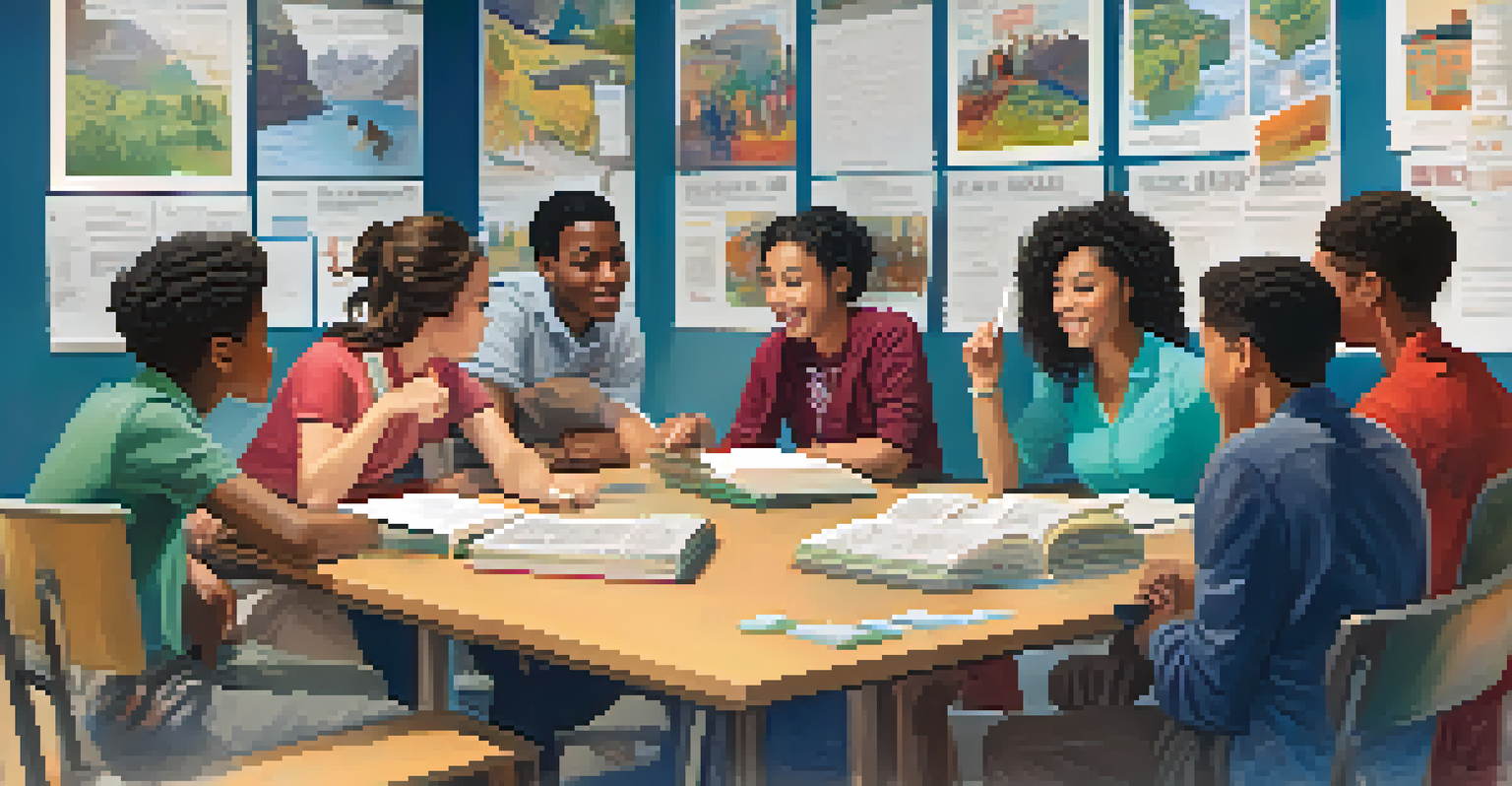Intellectual Growth: A Crucial Component of Holistic Development

Understanding Intellectual Growth in Holistic Development
Intellectual growth refers to the enhancement of cognitive abilities, critical thinking, and the acquisition of knowledge. It plays a vital role in holistic development, which encompasses mental, emotional, social, and physical aspects of a person's life. This growth is not merely about academic success; it involves fostering curiosity and a lifelong love for learning.
Education is the most powerful weapon which you can use to change the world.
Engaging with diverse subjects stimulates intellectual curiosity, prompting individuals to explore new ideas and perspectives. For example, someone who reads widely across genres may develop a richer understanding of human experiences, which enhances empathy and emotional intelligence. This interplay between intellectual growth and other developmental areas creates a well-rounded individual.
Moreover, intellectual growth encourages adaptability in an ever-changing world. As new challenges arise, those who have cultivated strong critical thinking skills can approach problems creatively and effectively. Therefore, nurturing intellectual growth is essential for personal and professional success in a holistic context.
The Role of Education in Fostering Intellectual Growth
Education serves as the primary vehicle for intellectual growth, providing structured opportunities for learning and exploration. However, it’s crucial that education goes beyond rote memorization; it should encourage critical thinking and problem-solving. Interactive learning environments, such as collaborative projects or discussions, can significantly enhance cognitive engagement.

For instance, schools that promote inquiry-based learning allow students to ask questions and seek answers, which deepens their understanding of complex concepts. This approach not only builds knowledge but also nurtures self-directed learners who are motivated to pursue their interests. Consequently, education becomes a catalyst for holistic development.
Intellectual Growth Fuels Holistic Development
Enhancing cognitive abilities and fostering a love for learning are essential for overall personal growth.
Additionally, lifelong learning should be embraced beyond traditional schooling. Opportunities such as workshops, online courses, and community education can help individuals continue to grow intellectually throughout their lives. This commitment to learning fosters resilience, adaptability, and a sense of purpose.
Cultivating Critical Thinking Skills
Critical thinking is a cornerstone of intellectual growth and involves analyzing information, evaluating arguments, and making reasoned decisions. It empowers individuals to sift through vast amounts of information and draw meaningful conclusions. This skill is particularly important in our digital age, where misinformation can spread rapidly.
The only limit to our realization of tomorrow will be our doubts of today.
To cultivate critical thinking, one can engage in activities such as debates, discussions, and problem-solving exercises. For example, participating in a debate club encourages individuals to consider multiple viewpoints and defend their position with evidence. This practice not only sharpens reasoning skills but also enhances communication and collaborative abilities.
Moreover, fostering a questioning mindset can further develop critical thinking. Encouraging curiosity about the world and prompting individuals to ask 'why' and 'how' helps them delve deeper into subjects. This approach not only promotes intellectual growth but also cultivates a habit of lifelong inquiry.
The Impact of Creativity on Intellectual Development
Creativity is often linked to intellectual growth, as it encourages innovative thinking and problem-solving. By allowing individuals to express themselves in imaginative ways, creativity fosters open-mindedness and flexibility in thought processes. This is essential in both personal and professional realms, where creative solutions can lead to breakthroughs.
For instance, integrating creative arts into education—such as music, visual arts, or writing—can enhance cognitive abilities and emotional expression. When individuals engage in creative activities, they often develop a greater capacity for abstract thinking and adaptability. This not only enriches their intellectual landscape but also contributes to emotional well-being.
Education as a Growth Catalyst
Education should prioritize critical thinking and problem-solving to promote lifelong learning and adaptability.
Furthermore, creativity nurtures resilience, as it teaches individuals to navigate failure and view challenges as opportunities for growth. This mindset complements intellectual development by encouraging learners to embrace experimentation without fear of making mistakes.
Building Emotional Intelligence through Intellectual Growth
Emotional intelligence (EI) and intellectual growth are interconnected, as understanding one’s emotions can enhance critical thinking and decision-making. EI involves recognizing, understanding, and managing emotions, both in oneself and others. As individuals engage in intellectual pursuits, they often encounter diverse viewpoints that challenge their emotional responses.
For instance, reading literature that explores complex characters and moral dilemmas can deepen one’s empathy and understanding of human behavior. This engagement not only sharpens cognitive abilities but also fosters a greater awareness of emotional dynamics in social interactions. Consequently, intellectual growth can lead to improved relationships and communication skills.
Moreover, nurturing emotional intelligence through intellectual avenues can enhance leadership qualities. Individuals who can balance cognitive reasoning with emotional awareness are often more effective leaders, as they can connect with others and inspire collaboration. Thus, focusing on both intellectual growth and EI contributes to holistic personal development.
The Importance of Lifelong Learning
Lifelong learning is essential for continuous intellectual growth, as it encourages individuals to seek knowledge and skills throughout their lives. This mindset can significantly impact personal and professional development, helping individuals stay relevant in rapidly changing environments. Embracing lifelong learning fosters adaptability and resilience.
For example, professionals who pursue ongoing education and training are better equipped to handle industry shifts and advancements. This proactive approach not only enhances their skill set but also boosts confidence and job satisfaction. In this way, lifelong learning becomes a crucial component of holistic development.
Supportive Environments Matter
Creating nurturing spaces for exploration and open dialogue is crucial for fostering curiosity and intellectual engagement.
Additionally, engaging in diverse learning experiences—from workshops to travel—exposes individuals to new ideas and cultures. This exploration broadens perspectives and encourages critical thinking, ultimately contributing to a richer intellectual journey. By prioritizing lifelong learning, individuals can cultivate a fulfilling and dynamic life.
Creating a Supportive Environment for Growth
A supportive environment is vital for fostering intellectual growth, as it encourages curiosity and experimentation. This environment can be cultivated at home, in schools, or within communities, emphasizing the importance of open dialogue and collaborative learning. When individuals feel safe to express their thoughts and ideas, they are more likely to engage deeply in intellectual pursuits.
For instance, parents can create a nurturing atmosphere by encouraging questions and discussions around various topics. Schools can adopt teaching methods that promote collaboration and peer learning, allowing students to learn from one another. This sense of community enhances motivation and interest in intellectual exploration.

Moreover, mentorship plays a significant role in creating a conducive environment for growth. Mentors can provide guidance, share experiences, and inspire individuals to pursue their intellectual passions. By fostering these supportive relationships, we can cultivate a culture of lifelong learners committed to holistic development.